【K12教育学习资料】高考英语 情态动词高考英语陷阱题总结归纳-情态动词(附详解)牛津版
高中英语知识点归纳情态动词和实义动词的辨析与用法总结
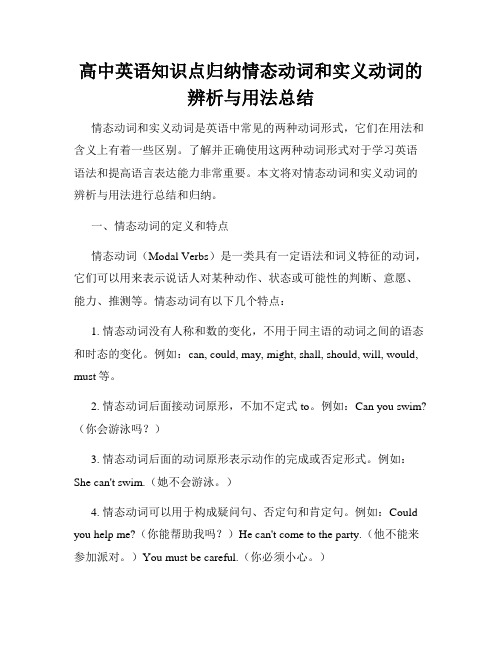
高中英语知识点归纳情态动词和实义动词的辨析与用法总结情态动词和实义动词是英语中常见的两种动词形式,它们在用法和含义上有着一些区别。
了解并正确使用这两种动词形式对于学习英语语法和提高语言表达能力非常重要。
本文将对情态动词和实义动词的辨析与用法进行总结和归纳。
一、情态动词的定义和特点情态动词(Modal Verbs)是一类具有一定语法和词义特征的动词,它们可以用来表示说话人对某种动作、状态或可能性的判断、意愿、能力、推测等。
情态动词有以下几个特点:1. 情态动词没有人称和数的变化,不用于同主语的动词之间的语态和时态的变化。
例如:can, could, may, might, shall, should, will, would, must等。
2. 情态动词后面接动词原形,不加不定式to。
例如:Can you swim?(你会游泳吗?)3. 情态动词后面的动词原形表示动作的完成或否定形式。
例如:She can't swim.(她不会游泳。
)4. 情态动词可以用于构成疑问句、否定句和肯定句。
例如:Could you help me?(你能帮助我吗?)He can't come to the party.(他不能来参加派对。
)You must be careful.(你必须小心。
)5. 情态动词在句中起到了"助动词"的作用,帮助说明说话人的意图、态度和推测等。
例如:You should study hard.(你应该努力学习。
)He must be at home.(他一定在家。
)二、实义动词的定义和特点实义动词(Main Verbs)是表达实际动作或状态的动词,它们具有人称和数的变化,可以接不定式、动名词、名词等作宾语,并且可以根据需要进行时态和语态的变化。
实义动词有以下几个特点:1. 实义动词可以根据主语的人称和数的不同进行变化。
例如:Iwalk to school.(我走路去上学。
备战2024年高考英语考试易错点09 情态动词和虚拟语气(4大陷阱)(解析版)

易错点09情态动词和虚拟语气目录01易错陷阱(4大陷阱)02举一反三【易错点提醒一】情态动词基本用法易混易错点【易错点提醒二】情态动词表判断推测易混易错点【易错点提醒三】情态动词后+have done易混易错点【易错点提醒四】虚拟语气易混易错点03易错题通关易错陷阱1:情态动词基本用法易混易错点。
【分析】功能:情态动词不能单独作谓语,后跟动词原形共同构成谓语。
形式:情态动词没有人称和数的变化。
否定形式是多数情态动词的否定式是在情态动词的后面加not。
时态:个别情态动词有现在式和过去式两种形式,过去式用来表达更加客气、委婉的语气。
位置:情态动词在谓语之前;谓语动词前若有助动词,则在助动词之前。
疑问句中在主语之前。
【高频考点】1.can/could表能力、请求、可能性(表示可能性用于否定句及疑问句中);特殊句型:can not...too.../enough(再怎么……也不过分)、can't help but do sth.(不得不做某事)、can't wait to do sth.(迫不及待地做某事)。
2.may/might表较小的可能性;表示请求许可以及祝愿。
句型和搭配:may/might as well do表示“还是……好;最好……”;may well do表示“很可能”;may可以用来表示祝愿,用“may+主语+动词原形”结构。
May you succeed.祝你成功。
3.must表示非常肯定的推测;表“偏要;非要……不可”;mustn't意为“禁止”,表示“不必”应用needn't。
4.shall的用法用于第二、三人称的陈述句中,表命令、警告、许诺或威胁等,语气强于should;用于第一、三人称的疑问句中,表示征询意见。
5.should/ought toshould表责任、义务、劝告、建议等,意为“应该”,还可表出乎意料的语气,意为“竟然”;ought to表义务或责任,意为“应该”。
XX高考英语典型陷阱题小结情态动词

XX高考英语典型圈套题小结神态动词有关链接:xx江苏地理试题及答案分析xx江苏真题及答案 ( 历史 )xx江苏历史试题及答案xx江苏真题及答案 ( 政治 )xx江苏历史试题及答案分析出 guo 高考频道在考试后实时宣布各科高考试题答案和高考作文及试卷专家评论,请广大考生家长关注。
光阴飞逝,暑期过去了,新学期开始了,不论宁愿与否,不论准备与否,我们已走进高三,走近我们的梦 ! 祝福决斗 xx 高考的新高三学员能倍加努力,在xx 年高考取也能获得优秀的成绩。
高考英语圈套题总结概括——神态动词◆典型圈套题剖析◆1.―Mike is often absent from class.‖ ―Tell him he_____ answer for it if he goes on behaving like that.‖A. shallB. willC. wouldD. can【圈套】几个扰乱项均有可能误选。
【剖析】最正确答案选 A.shall用作神态动词主要有以下两个用法:(1)用于疑问句中征采建议。
如:Shall I help you?要不要我帮帮你?Shall I open the window?要我把窗子翻开?(2)用于述句中表示允、告、警示、威、命令、定、必定性等 ( 可用于各人称 ) 。
如:You shall suffer for this.你会此事吃苦的。
(表威 ) Each petitor shall wear a number.每个参者要戴一个号。
(表定 )You shall hear everything as soon as you e.你一来即可听到全部状况了。
( 表允 )做以下 ( 答案均 shall):(1)“I promise that she _____ get a nice present on her birthday.” “Will it be a great surprise to her?”A. shouldB. mustC. wouldD. shallskill,2.You _______ pay too muchattention to your readingas it is so important.A. cannotB. shouldn‘tC. mustn‘tD. needn‘t【圈套】几个干均有可能。
情态动词高中知识点高三

情态动词高中知识点高三情态动词是一类具有特殊意义和用法的动词,它们在句子中一般与实义动词连用,表示说话人的推测、命令、请求、建议等情态。
在高中英语学习中,掌握情态动词的正确用法至关重要。
本文将介绍情态动词的相关知识点,帮助高三学生更好地运用这一语法现象。
一、情态动词的定义情态动词,又称情态助动词,是用来表示说话人对某种动作或状态的态度、推测、可能性、能力、意愿、义务等情态的一类特殊动词。
常见的情态动词包括can、could、may、might、must、shall、should、will、would等。
二、情态动词的用法1. 表示能力情态动词can表示某人具有能力或可能做某事,could用于过去说法。
例如:- She can speak three languages fluently.(她能说流利的三种语言)- He could lift the heavy boxes when he was younger.(他年轻时能搬起这些沉重的箱子)2. 表示推测和可能性情态动词may、might、could用于表示推测和可能性。
may用于表示较为肯定的推测,might和could表示推测的可能性较小。
例如:- The weather is cloudy, it may rain later.(天气多云,可能会下雨)- He might be late for the meeting.(他可能会迟到会议)3. 表示义务和建议情态动词must表示说话人对某种行为具有强烈的责任感或坚决要求,should表示建议。
例如:- We must obey the laws of the country.(我们必须遵守国家的法律)- You should apologize to your friend for your mistake.(你应该为你的错误向朋友道歉)4. 表示许可和请求情态动词can、may、could用于表示允许和请求。
高考英语新情态动词知识点

高考英语新情态动词知识点在高考英语中,情态动词一直是一个重要的语法知识点。
近年来,对于新情态动词的考查也逐渐增多。
新情态动词包括 ought to、have to、be supposed to 等,它们在用法和语义上都有其独特之处。
首先,我们来看看 ought to。
ought to 表示“应该”,语气比 should 稍强。
它常用于表示责任、义务或正确的做法。
例如:“You ought to study harder if you want to get good grades”(如果你想取得好成绩,你应该更努力学习。
)需要注意的是,ought to 的否定形式是 ought not to,疑问形式是将 ought 提前。
接着是 have to。
have to 强调由于外部的客观原因而“不得不”做某事。
它有人称、数和时态的变化。
比如:“I have to go now because it's getting late”(我现在得走了,因为天色已晚。
)“She had to stay athome yesterday because she was ill”(她昨天不得不待在家里,因为她生病了。
)与 must 不同,must 通常表示主观上的“必须”,而 have to 更侧重于客观上的无奈。
再来说说 be supposed to。
这个短语有多种含义,常见的有“应该;被期望”。
“You are supposed to arrive on time”(你应该准时到达。
)它还可以表示“本应;本该”,用来表示某事没有按照预期发生。
例如:“The train was supposed to leave at 9 o'clock, but it's delayed”(火车本该 9 点出发,但晚点了。
)在具体的语境中,这些新情态动词的运用需要我们仔细分辨。
比如,在表达建议时,ought to 可能更合适;在强调客观条件限制时,have to 更为准确;而 be supposed to 则在描述期望和规定方面用得较多。
情态动词知识点总结高中

情态动词知识点总结高中情态动词是英语中一个重要的语法现象,它们能够表达说话者的情感、态度、意愿等,以及表达说话者对事件的推测、猜测、可能性等。
了解情态动词的用法,能够帮助我们更准确地表达自己的意思,也有助于我们理解他人的意图。
本文将对情态动词的概念、用法、以及常见的情态动词进行总结和归纳,以便于读者更深入地理解情态动词的使用。
一、情态动词的概念情态动词(Modal Verb)是一类特殊的助动词,用来表示说话者的情感、态度、意愿等,以及表达说话者对事件的推测、猜测、可能性等。
情态动词通常用于句子的前面,后面跟动词原形,用来构成不同的语法结构和表达不同的含义。
英语中常见的情态动词有can、could、may、might、must、shall、should、will、would、ought to等。
这些情态动词具有一些共同的特点,比如不能独立完成谓语,后面必须跟动词原形;在疑问句和否定句中,情态动词的位置要发生变化等。
二、情态动词的用法1. 表示能力和可能性can与could表示说话者的能力或者对某种事情的可能性,其中can用于现在时,could用于过去时。
比如:I can speak Spanish.(我会说西班牙语。
)She could swim when she was five.(她五岁的时候就会游泳。
)may与might也表示可能性,may 用于现在时,might 用于过去时。
比如:It may rain tomorrow.(明天可能会下雨。
)I thought she might come.(我以为她可能会来。
)2. 表示请求和建议will与would可以表示请求,will用于肯定句,would用于否定句和疑问句。
比如:Will you please help me?(你能帮帮我吗?)I would like to go with you.(我想和你一起去。
)shall与should也可以表示请求或者建议,should更多地表示建议。
高考英语情态动词知识梳理与精题分析

高考英语情态动词知识梳理与精题分析内容解读1.准确把握情态动本身的意义和用法。
包括can, may, must, will, shall, would, should, could, ought to, might, dare, need等。
2.准确把握情态动词的推测、判断用法。
3.准确把握情态动词在虚拟语气句子结构中的使用。
能力解读1.了解常见情态动词的语法特征、语义特征及相互间的区别:2.能够根据上下文的意思来确定情态动词的应用。
命题规律1.情态动词和虚拟语气在近几年高考中均是重点项目。
根据对以上各题的分析,高考的热点依次是:①推测和可能性;②"情态动词+ have done"结构;③虚拟语气;④shall, should, can 和must 表示特定语气。
2.试题的立意不偏不怪,但是有效信息越来越隐蔽,情景越来越生动、真实,考查角度越来越细微化、综合化,而这些因素都增加了试题的难度。
每年高考的单项填空部分必然有一道考查情态动词的题目,这一点是不会动摇的。
试题的特征不会有显著变化,即:立意仍将不偏不怪,情景仍将逼近真实,设问角度仍将综合化和细微化。
突破方法1.学习和掌握情态动词的意义和用法,应遵循如下步骤:①阅读语法参考书,首先从整体上把握情态动词的语法特征和语义特征;②逐个学习,了解每个情态动词的用法特征;③认真区别具有相同功能的、意思相近的情态动词的用法;④收集大量真实的口语材料(如教材中的对话材料及听力材料),在真实的实际情景中印证和领悟它们的用法特征。
2.解答情态动词类的题目时,一定要细细领会情景特征,情景中没有废话,不要放过任何细节。
只有这样,才会找到足够的有效信息,做出最佳选择。
3.一定要将上面的提到的高考热点落到实处,反复咀嚼,反复演练,确保精通。
知识梳理梳理一情态动词的类型和特征一、情态动词的类型1.只作情态动词用的有:must, can (could), may (might), ought to;2.可作情态动词也可作实义动词的有:need, dare (美语中常用作实义动词);3.可作情态动词也可作实义动词的有:shall (should), will (would);4.具有情态动词的某些特征的有:have (had) to, used to。
高考英语情态动词知识点分类汇编附解析(2)
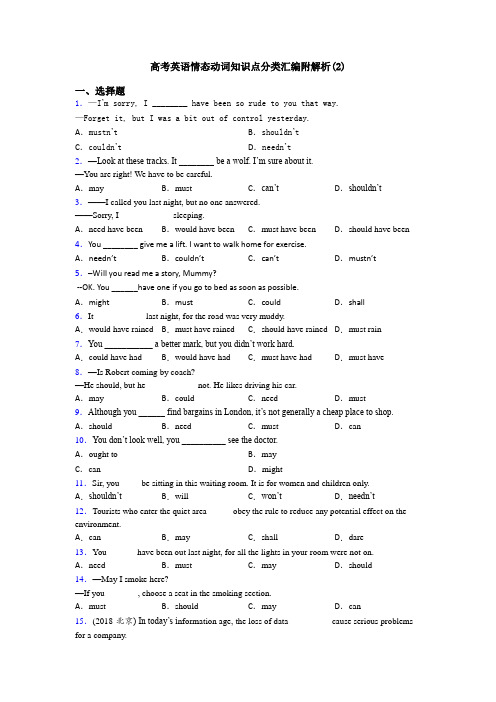
高考英语情态动词知识点分类汇编附解析(2)一、选择题1.—I’m sorry, I ________ have been so rude to you that way.—Forget it, but I was a bit out of control yesterday.A.mustn’t B.shouldn’tC.couldn’t D.needn’t2.—Look at these tracks. It ________ be a wolf. I’m sure about it.—You are right! We have to be careful.A.may B.must C.can’t D.shouldn’t 3.——I called you last night, but no one answered.——Sorry, I____________ sleeping.A.need have been B.would have been C.must have been D.should have been 4.You ________ give me a lift. I want to walk home for exercise.A.needn’t B.couldn’t C.can’t D.mustn’t5.–Will you read me a story, Mummy?--OK. You ______have one if you go to bed as soon as possible.A.might B.must C.could D.shall6.It ___________ last night, for the road was very muddy.A.would have rained B.must have rained C.should have rained D.must rain 7.You ___________ a better mark, but you didn’t work hard.A.could have had B.would have had C.must have had D.must have 8.—Is Robert coming by coach?—He should, but he ___________ not. He likes driving his car.A.may B.could C.need D.must 9.Although you ______ find bargains in London, it’s not generally a cheap place to shop. A.should B.need C.must D.can10.You don’t look well, you __________ see the doctor.A.ought to B.mayC.can D.might11.Sir, you ____ be sitting in this waiting room. It is for women and children only. A.shouldn’t B.will C.won’t D.needn’t 12.Tourists who enter the quiet area _____ obey the rule to reduce any potential effect on the environment.A.can B.may C.shall D.dare13.You ______ have been out last night, for all the lights in your room were not on. A.need B.must C.may D.should 14.—May I smoke here?—If you _______, choose a seat in the smoking section.A.must B.should C.may D.can 15.(2018·北京) In today’s i nformation age, the loss of data _________ cause serious problems for a company.A.need B.shouldC.can D.must16.Helen________ go on the trip with us, but she isn’t quite sure yet.A.shall B.may C.must D.can 17.—Do you know where David is? I couldn’t find him anywhere.— Well. He ________ have gone far — his coat is still here.A.shouldn’t B.mustn’t C.can’t D.wouldn’t 18.------ Tom is never late for work. Why is he absent today?------ Something _________ to him.A.must happen B.should have happenedC.could have happened D.must have happened19.You _________ me about it earlier, but you didn't.A.should have told B.would have toldC.must have told D.should tell20.Although passing the driving test ________ be difficult now, it’s worth the efforts. A.need B.shallC.can D.should21.— Did Bob take the job in the supermarket? — No, but I think he _________. A.will have B.may have C.should have D.must have 22.We lost our way in that small village, otherwise we ________more places of interest yesterday.A.visited B.had visitedC.would visit D.would have visited23.He plays basketball very well. He_________ it a lot.A.may practise B.must practiseC.must have practised D.should have practiced24.You________have scolded him for his poor performance.After all,he had done his best. A.wouldn’t B.couldn’t C.mustn’t D.shouldn’t 25.—You look so tired. You________ late last night.—Yes. I had to to do an important report and stayed up till I completed it.A.should sleep B.must sleepC.should have slept D.must have slept【参考答案】***试卷处理标记,请不要删除一、选择题1.B解析:B【解析】考查情景交际和情态动词。
情态动词高考重要知识汇总

情态动词高考知识点汇总一、表猜测1、可能性分为客观的可能性和具体事情实际发生的可能性两种。
can 可用于肯定句中表示客观的(理论的)可能性。
表示具体事情实际发生的可能性时,may,must常用于肯定句;can常用于否定句、疑问句或感叹句中,表示怀疑、惊讶或不相信等。
Eg. Accidents can happen on such rainy days.(客观的可能性)Peter may come with us tonight, but he isn’t sure yet. (实际的可能性)This can’t \couldn’t be dne by him. (表示不相信)This may not be done by him.(表不确定)Can this be done by him?(表示疑惑、惊讶)I didn’t hear the phone. I must have been asleep.(表肯定)表示具体事情实际发生的可能性的层次比较:2、should 表推测时,表示确定或可能有的未来或期望,即合乎理想的情况或结果。
Eg. He ought to \should be here in time. – He started early enough.We should arrive before dark.经典考题:1、-- How’s your tour around the North Lake? Is it beautiful?-- It ____ be, but it is now heavily polluted.A. willB. wouldC. sholdD. must2、There ____ be any difficulty about passing the road test since you have practiced a lotin the driving school.A. mustn’tB. shan’tC. shouldn’tD. needn’t3、-- She looks very happy. She ____ have passed the exam.-- I guess so. It’s not difficult after all.A. shoudB. couldC. must C. might4、What do you mean, there are onlyten tickets? There ____ be twelve.A. shouldB. wouldC. willD. shall5、-- It’s the office! So you ____know eating is not allowed here.-- Oh, sorry.A. mustB. willC. mayD. need6、-- Hi, Tom. Any idea where Jane is?-- She ____ in the classroom. I saw her there just now.A. shall beB. should have beenC. must beD. might have been7、One of the few things you ___ say about English people with certainty is that they talka lot about the weather.(表允许)A. needB. mustC. shouldD. can8、The printer is of good quality. If it ____ break down within the first year, we wouldrepair it at our expense.A. wouldB. shouldC. couldD. might9、Y ou ____ be hungry already.- Y ou had lunch only tw hours ago!A. wouldn’tB. can’tC. mustn’tD. needn’t10、It is usually warm in my hometown in March, but it _____ be rather cold sometime.A. mustB. caanC. shouldD. would11、Peter ____ be really difficult at times even though he’s a nice person in general.A. shallB. shouldC. canD. must12、Liza ____ well not want to go on the trip- she hates travelling.A. willB. canC. mustD. may二、表示请求、允许、允诺1、当对方是决策者时,你代表你(们)自己(I, we),或代表第三者(he, she, they)向对方(you)请示或提出建议时用:①Shall\May (Might)\Can(Could) I \we …?②Shall he\ she\they…?③Would \Will you…?Eg. Shall we begin our class?Shall the driver wait outside?When shall my father be able to leave hospital?2、could\might\would\should 表委婉的功能。
【英语】高考英语情态动词答题技巧及练习题(含答案)
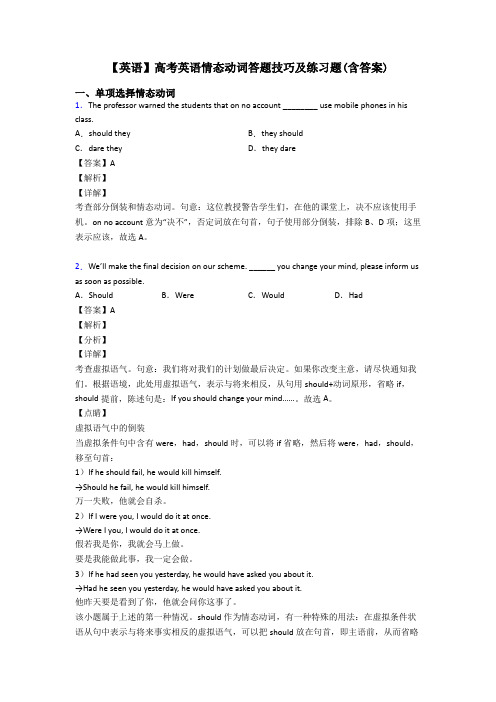
【英语】高考英语情态动词答题技巧及练习题(含答案)一、单项选择情态动词1.The professor warned the students that on no account ________ use mobile phones in his class.A.should they B.they shouldC.dare they D.they dare【答案】A【解析】【详解】考查部分倒装和情态动词。
句意:这位教授警告学生们,在他的课堂上,决不应该使用手机。
on no account意为“决不”,否定词放在句首,句子使用部分倒装,排除B、D项;这里表示应该,故选A。
2.We’ll make the final decision on our scheme. ______ you change your mind, please inform us as soon as possible.A.Should B.Were C.Would D.Had【答案】A【解析】【分析】【详解】考查虚拟语气。
句意:我们将对我们的计划做最后决定。
如果你改变主意,请尽快通知我们。
根据语境,此处用虚拟语气,表示与将来相反,从句用should+动词原形,省略if,should提前,陈述句是:If you should change your mind……。
故选A。
【点睛】虚拟语气中的倒装当虚拟条件句中含有 were,had,should时,可以将if省略,然后将 were,had,should,移至句首:1)If he should fail, he would kill himself.→Should he fail, he would kill himself.万一失败,他就会自杀。
2)If I were you, I would do it at once.→Were I you, I would do it at once.假若我是你,我就会马上做。
高中高考英语情态动词知识点考点归纳

She needn’t have come in person — a letter would have been enough. 她本不必亲自来——写封信来就足够了。
Need you have paid so much? 你当时真须要付那么多钱吗?
高中高考英语情态动词知识点考点归纳
一、弄清三组情态动词的用法区别
温馨提示:以下所讲的几组情态动词的用法区别,是学好情态动词的最基础的知识,学好它,不仅有助于你做好情态动词单项填空题,而且还有助于培养你的英语语感和提高写作的准确性。
1. must 与 have to 的区别
(3) be able to 不仅有多种时态形式(通常不用于进行时或与 be going to 连用),而且还可以与某些情态动词连用 (通常不与 can 连用),甚至还可以有非谓语形式。如:
He has not been able to go to school for a week. 他已有一周不能上学了。
I regret to have to trouble you again. 我很抱歉不得不再麻烦你一次。
I only saw her the evening, having to be away all day. 我因整天得外出,所以只能晚上见到她。
(4) 否定式的含义不同:must 的否定式 mustn’t 意为“不准”“不允许”;而 have to 的否定式 don’t have to 意为“不必”(= needn’t)。
分析:答案选D。后文说“他总是穿绿色衣服”,据此语境可推知,这件衣“可能是”哈利的,could表示可能性。
(3) —Do you know where David is? I couldn’t find him anywhere.
高考英语情态动词讲解及习题(附答案)
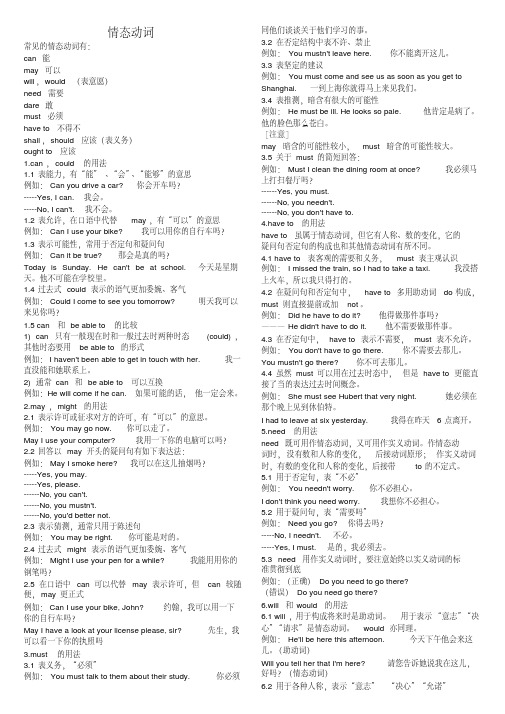
情态动词常见的情态动词有:can 能may 可以will,would (表意愿)need 需要dare 敢must 必须have to 不得不shall,should 应该(表义务)ought to 应该1.can,could 的用法1.1表能力,有“能”、“会”、“能够”的意思例如:Can you drive a car? 你会开车吗?-----Yes, I can. 我会。
-----No, I can't. 我不会。
1.2表允许,在口语中代替may,有“可以”的意思例如:Can I use your bike?我可以用你的自行车吗?1.3表示可能性,常用于否定句和疑问句例如:Can it be true?那会是真的吗?Today is Sunday. He can't be at school.今天是星期天。
他不可能在学校里。
1.4过去式could表示的语气更加委婉、客气例如:Could I come to see you tomorrow?明天我可以来见你吗?1.5 can 和be able to 的比较1) can 只有一般现在时和一般过去时两种时态(could),其他时态要用be able to的形式例如:I haven't been able to get in touch with her.我一直没能和她联系上。
2) 通常can 和be able to 可以互换例如:He will come if he can.如果可能的话,他一定会来。
2.may,might的用法2.1表示许可或征求对方的许可,有“可以”的意思。
例如:You may go now.你可以走了。
May I use your computer?我用一下你的电脑可以吗?2.2回答以may开头的疑问句有如下表达法:例如:May I smoke here? 我可以在这儿抽烟吗?-----Yes, you may.-----Yes, please.------No, you can't.------No, you mustn't.------No, you'd better not.2.3表示猜测,通常只用于陈述句例如:You may be right.你可能是对的。
【推荐】高考英语情态动词高考英语陷阱题总结归纳-情态动词(附详解)牛津版
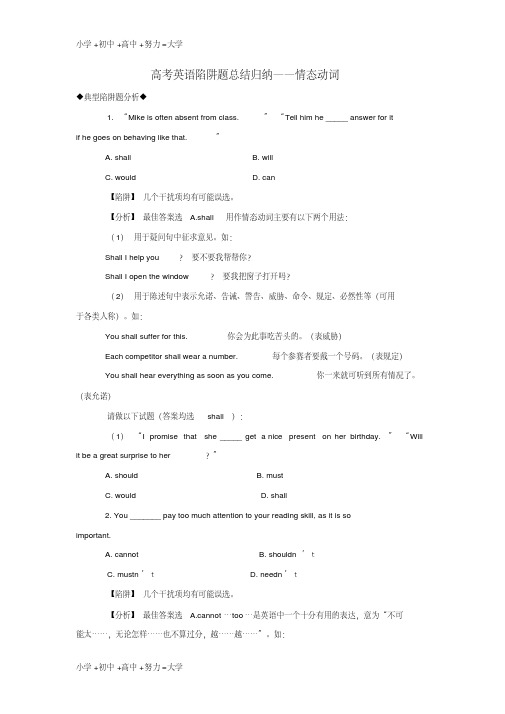
高考英语陷阱题总结归纳——情态动词◆典型陷阱题分析◆1. “Mike is often absent from class.”“Tell him he _____ answer for itif he goes on behaving like that.”A. shallB. willC. wouldD. can【陷阱】几个干扰项均有可能误选。
【分析】最佳答案选 A.shall 用作情态动词主要有以下两个用法:(1)用于疑问句中征求意见。
如:Shall I help you?要不要我帮帮你?Shall I open the window?要我把窗子打开吗?(2)用于陈述句中表示允诺、告诫、警告、威胁、命令、规定、必然性等(可用于各类人称)。
如:You shall suffer for this. 你会为此事吃苦头的。
(表威胁)Each competitor shall wear a number. 每个参赛者要戴一个号码。
(表规定)You shall hear everything as soon as you come. 你一来就可听到所有情况了。
(表允诺)请做以下试题(答案均选 shall):(1)“I promise that she _____ get a nice present on her birthday.” “Will it be a great surprise to her?”A. shouldB. mustC. wouldD. shall2. You _______ pay too much attention to your reading skill, as it is soimportant.A. cannotB. shouldn’tC. mustn’tD. needn’t【陷阱】几个干扰项均有可能误选。
【分析】最佳答案选 A.cannot…too…是英语中一个十分有用的表达,意为“不可能太……,无论怎样……也不算过分,越……越……”。
【高考英语】情态动词和虚拟语气(讲解)

语法专项情态动词一.情态动词的含义:情态动词只有情态意义,即表示说话人对动作的观点,如需要,可能,意愿或怀疑等。
情态动词主要有:can(could), may(might), must, shall(should), will(would), need, dare(dared), have to(had to),ought to, had better,would rather, used to等。
二.情态动词的特征:1.在形式上,情态动词没有实义动词的各种变化,只有could, would, had to, might, should等几个过去式。
其他如must, ought to等的过去式皆与现在式同形,且在各种人称后都用同样的形式。
2.在意义上,大多数情态动词有多个意义。
如can可表示“能够”,“可能”,“允许”等。
3.在用法上。
情态动词(除ought后接不定式外)与助动词一样,后接动词原形构成谓语动词。
三.情态动词的用法:(一)can/could的用法:1.表示能力:①表示现在的能力用can;表示过去的一般能力用could,若表示过去经过努力而做成某事,则用was/were able to do sth. 或managed to do sth. 或succeeded in doing sth.---Everyone here can speak English. (现在的能力)---A fire broke out in the hotel last night, but everyone was able to escape. (经过努力做成某事)②表示将来的能力常不用can,而用will be able to的将来时态:---I’ll be able to speak French in another few months.2.表示请求许可:若表示请求别人允许自己做某事,can/could均可,could表示委婉语气。
高考英语情态动词全解析

情态动词与高考一、情态动词情态动词是一种本身有一定的词义,用来表示说话人的情感、态度或语气的动词。
但不能单独作谓语,只能和其他动词原形构成谓语。
情态动词在高考中主要考查四点:情态动词表示推测和可能性的用法;情态动词与虚拟语气;情态动词的表达―情感、态度、语气等‖,情态动词表示―必要性‖等方面的用法。
二、情态动词的特点1.没有人称和数的变化。
2.有些情态动词有过去式的变化: e.g. will → would , can → could , may→ might , dare → dared三、情态动词的否定形式情态动词+ not +动词原形can not: can't , must not: mustn't , need not : needn't四、情态动词的用法及相互间的区别(注意:这是常考的考点)1. can , could could 是can的过去式, 表示过去有能力及过去存在的可能性; 有时用于疑问句表示委婉地提出问题。
–Could I use your bike ?--Yes,you can.(1). 表示体力或脑力方面的能力; can’t 不能,表示没能力(2). 表示允许,can’t 表示禁止,不允许(3)表示可能性,can, could表达推测时,一般用于疑问句和否定句中;can/could have done 可能做了某事1).You ______ be hungry already — you had lunch only two hours ago!A. wouldn’tB. can’tC. mustn’tD. needn’t2).She ______ have left school, for her bike is still here.A. can’tB. wouldn’tC. shouldn’tD. needn’t(4)can用于肯定句中表示一种理论上的可能性,并不牵涉是否真的会发生,在这种用法中can只能与动词原形连用,译成“有时候会”;could用于肯定句中,语气比may/ might更弱。
- 1、下载文档前请自行甄别文档内容的完整性,平台不提供额外的编辑、内容补充、找答案等附加服务。
- 2、"仅部分预览"的文档,不可在线预览部分如存在完整性等问题,可反馈申请退款(可完整预览的文档不适用该条件!)。
- 3、如文档侵犯您的权益,请联系客服反馈,我们会尽快为您处理(人工客服工作时间:9:00-18:30)。
高考英语陷阱题总结归纳——情态动词◆典型陷阱题分析◆1. “Mike is often absent from class.” “Tell him he _____ answer for it if he goes on behaving like that.”A. shallB. willC. wouldD. can【陷阱】几个干扰项均有可能误选。
【分析】最佳答案选A.shall 用作情态动词主要有以下两个用法:(1)用于疑问句中征求意见。
如:Shall I help you?要不要我帮帮你?Shall I open the window?要我把窗子打开吗?(2)用于陈述句中表示允诺、告诫、警告、威胁、命令、规定、必然性等(可用于各类人称)。
如:You shall suffer for this. 你会为此事吃苦头的。
(表威胁)Each competitor shall wear a number. 每个参赛者要戴一个号码。
(表规定)You shall hear everything as soon as you come. 你一来就可听到所有情况了。
(表允诺)请做以下试题(答案均选 shall):(1)“I promise that she _____ get a nice present on her birthday.” “Will it be a great surprise to her?”A. shouldB. mustC. wouldD. shall2. You _______ pay too much attention to your reading skill, as it is so important.A. cannotB. shouldn’tC. mustn’tD. needn’t【陷阱】几个干扰项均有可能误选。
【分析】最佳答案选A.cannot…too…是英语中一个十分有用的表达,意为“不可能太……,无论怎样……也不算过分,越……越……”。
如:You can’t be too careful. 你越仔细越好。
You can’t praise the too much. 这本书值得大加赞扬。
We cannot work too much for the people. 我们为人民做工作是不可能做过头的。
A woman cannot have too many clothes. 女人买的衣服再多也不算多。
注:有时也可用 can never, impossible 等与too连用来表示类似意思。
如:It is impossible to get there too soon. 去那儿越早越好。
3. “Is John coming by train?” “He should, but he _____ not. He likes driving his car.”A. mustB. canC. needD. may【陷阱】可能误选B或C.【分析】最佳答案为D.may 表推测,may not 意为“可能不(会坐火车来)”。
句中的 He should 为 He should come by train 之省略,由于其后出现转折连词 but,说明语意有变化,再结合下文的 He likes driving his car,便可决定此题选D.注意,不能选B,因为can表示推测时通常不用肯定陈述句。
4. “I heard they went skiing in the mountains last winter.” “It ____ true because there was little snow there.”A. may not beB. won’t beC. couldn’t beD. mustn’t be【陷阱】几个干扰项均有可能误选。
【分析】此题最佳答案为C,主要由下文的 because there was little snow there 这一语境所决定,既然“没下什么雪”,那么“滑雪”就应是“不可能”,所以选couldn’t be,即选C.5. “Do you think he is lazy?” “I _____ so once, but I don’t now.”A. may have thoughtB. can have thoughtC. may thinkD. might think答案选A.从答话人的语境可知,空格处的意思“曾经这样想过”,即对过去情况作推测,故应用“情态动词+动词完成式”;又因为 can 表推测不用于肯定句,故选A.请看类例:Their answers are exactly the same — one of them ______ from the other.A. must copyB. must have copiedC. should copyD. should have copied答案选B,既然两人的答案完全一样,说明“抄袭”已经发生,故用“情态动词+动词完成式”,根据句意,应选B而不能选D.6. Y ou _____ be right, but I don’t think you are.A. canB. couldC. mustD. should【陷阱】几个干扰项均有可能误选。
【分析】从语境上看,C、D不宜选,在剩下的A和B中,许多同学想当然地选了A,认为整个句子为现在时态,所以选can,而不选过去式 could,但是最佳答案却是B而不是A.按照英语语法,情态动词can 用于推测表示可能性时,通常只用于否定句或疑问句中,而不用于肯定句中;但 could 用于表推测时,却不仅可用于否定句和疑问句,也可用于肯定句,且此时的 could 并不是 can 的过去式,与 can 也没有时间上的差别,只是 could 比can语气更委婉,所以答案选B.注:can 在以下特殊情况下,也可用于肯定句。
一是表示抽象的可能性,即从理论上或逻辑上分析是可能的,但是实际上未必会发生。
如:Anyone can make mistakes. 任何人都可能会犯错误。
二是后接“be (get, seem, become)+形容词”,表示“有时会”、“时常会”等。
如:My father can be very unreasonable. 我父亲有时候很不讲道理。
◆精编陷阱题训练◆1. “I thought you wouldn’t mind.” “Well, as a matter of fact I don’t, but you _____ me first.”A. should askB. should have askedC. must askD. must have asked2. “I called you yesterday. A woman answered, but I didn’t recognize her voice.” “Oh, it _____ my aunt Jean.”A. must beB. must have beenC. might beD. can have been3. That car nearly hit me; I ______.A. might be killedB. might have been killedC. may be killedD. may been killed4. It’s a very kind offer, but I really _____ accept it.A. mustn’tB. needn’tC. can’tD. don’t5. The p olice still haven’t found her, but they’re doing all they _____.A. mayB. canC. mustD. will6. You _____ practise the drums while the baby is sleeping.A. needn’tB. mightn’tC. must n’tD. won’t7. You _____ him the news; he knew it already.A. needn’t tellB. needn’t have toldC. mightn’t tellD. mightn’t have told8. As she’s not here, I suppose she _____ home.A. must goB. must have goneC. might goD. might be going9. Are you still here? You ______ home hours ago.A. should goB. should have goneC. might goD. may have gone10. “I called you yesterday. A woman answered, but I didn’t recognize her voice.” “Oh, it _____ my aunt Jean.”A. must beB. must have beenC. might beD. can have been11. I _______ have met him a long time ago. Both his name and face are very familiar.A. mayB. canC. wouldD. should13.“Shall we go shopping?” “Sorry, we _______ buy anything now because none of the shops are open.”A. mustn’tB. needn’tC. can’tD. shouldn’t14. They often go to the restaurants for meals. They _____ be very poor.A. mustn’tB. can’tC. may notD. needn’t15. I didn’t see her in the meeting room this morning. She ______ have spoken at the meeting.A. mustn’tB. shouldn’tC. needn’tD. couldn’t17. He ______ the test again, in which case, his mother will be very disappointed.A. might failB. must have failedC. should failD. could have failed18. “Why didn’t she come to the meeting yesterday?” “I’m not so sure. She ______ ill.”A. should beB. should have beenC. must beD. might have been19. Why did you just sit and watch? You _______ me.A. could helpB. should helpC. could have helpedD. must have helped20. “You ______ your teacher for help. He is kind-hearted.” “Yes. A whole day _______.”A. can ask, will wasteB. must have asked, had wastedC. could have asked, was wastedD. shouldn’t have asked, would be wasted21. “Is there a flight to London this evening?” “There _______ be. I’ll phone the airport and find it out.”A. mustB. mightC. wouldD. can22. “Show me your permit, please.” “Oh, it’s not in my pocket. It______.”A. might fall outB. could fall outC. should have fallen outD. must have fallen out23. “Look at these tracks. It _______be a wolf.” “Don’t be so sure. I think it _______ be a fox.”A. must; couldB. may; mightC. need; mustD. could; need25. “Did Jim come?” “I don’t know. He _______ while I was out.”A. might have comeB. might comeC. mush have comeD. should have come◆答案与解析◆1. 选B,should 后接动词完成式表示“本来应该做某事,结果未做”,此处含有责备之意。
